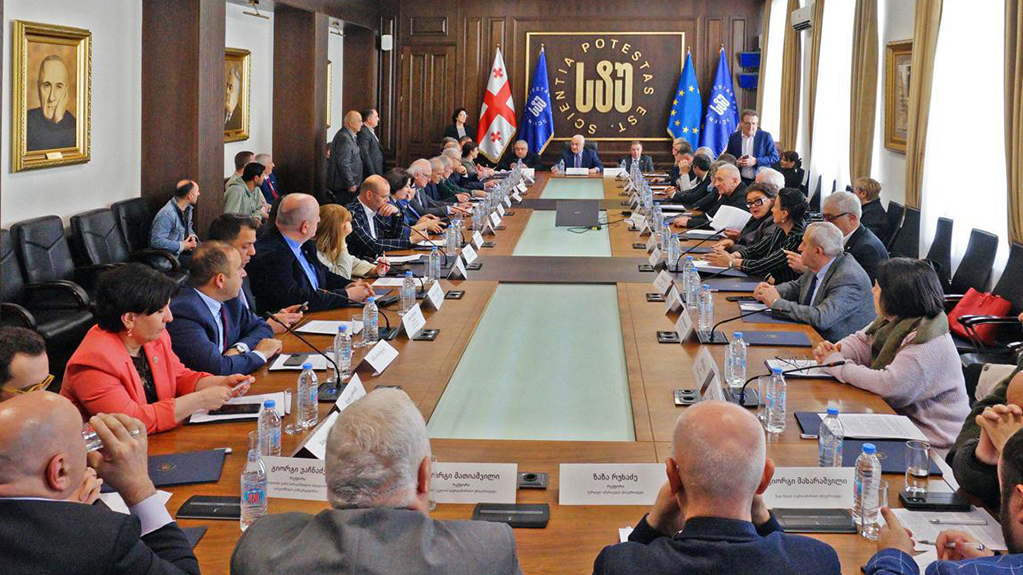The rectors of 38 universities have responded to the protest of students and professors against the Russian Law. According to the joint statement signed by them, any political processes should remain outside the academic space and should not affect the functioning of universities. Additionally, the rectors state that it is unacceptable for "certain groups" to make political statements on behalf of the universities.
News
After more than 30 university students and professors from all over Georgia joined the protest against the Russian Law, it was reported that the Ministry of Education requested university leaders to condemn the strike. On May 13, a source provided the TV company Mtavari Arkhi with the statement’s copy, which the Ministry allegedly sent to the universities for signature. The texts of the rector's statement today and the document published by Mtavari Arkhi on May 13 are almost identical.
The rectors' statement was published by the Technical University of Georgia, whose rector, Davit Gurgenidze, is the permanent chairman of the rectors' conference.
"Universities of Georgia, members of the Permanent Conference of Rectors of Higher Educational Institutions of Georgia, we respond to the current events in the country, which have been reflected in the conduct of the educational process in universities.
The fundamental basis of our European future is the education of young people in a free and non-discriminatory environment. Therefore, we believe that any political process should remain outside the academic space, ensuring it does not affect the functioning of universities and the conduct of teaching and learning. Students' interests and the educational process should not be harmed. We emphasize that guaranteeing freedom of expression is of fundamental value to us.
It is unacceptable for some representatives of the academic staff to refuse to fulfill their duties, as this hinders the educational process and violates the constitutional rights of students. It should be noted that despite these developments, the educational process continues in universities.
Furthermore, the non-attendance of academic staff at lectures not only violates their obligations under the law and their employment contracts with the universities but also directly harms the interests of students attending lecture courses today.
The disruption of the educational process by the lecturers prevents the realization of the goals of higher education and the achievement of learning outcomes provided by the educational programs. All of this has a negative impact on the performance of national and European quality assurance standards.
It is the responsibility of each university, its professors, and teachers to ensure the uninterrupted conduct of the educational process for students and the creation of a politics-free, healthy, and academic educational environment in the university spaces. If our intention is a better Georgia, the only and best way to achieve it is through quality education.
We also emphasize that it is unacceptable for certain groups to make political statements on behalf of universities.
It is the duty of each of us to provide together an appropriate educational environment for our students, which is especially important today on the way to the European integration of Georgia," the statement said.
The joint statement is signed by the rectors of the following universities: 1. Ivane Javakhishvili Tbilisi State University; 2. Technical University of Georgia; 3. Tbilisi State Medical University; 4. Kutaisi International University; 5. Shota Rustaveli State University of Theater and Cinema of Georgia; 6. Batumi Shota Rustaveli State University; 7. Tbilisi Vano Sarajishvili State Conservatory; 8. Telavi State University named after Jacob Gogebashvili; 9. Tbilisi State Art Academy named after Apollon Kutateladze; 10. Akaki Tsereteli State University; 11. Sukhumi State University; 12. Samtskhe-Javakheti State University; 13. Gori State University; 14. Shota Meskhia Zugdidi State University of Education; 15. Educational University Batumi State Maritime Academy; 16. Batumi University of Arts; 17. Georgian National Defense Academy named after Davit Agmashenebeli; 18. National University of Georgia - SEU; 19. Tbilisi Theological Academy and Seminary of the Apostolic Autocephalous Orthodox Church of Georgia; 20. Caucasus International University; 21. Georgian University named after Saint Andrew the First of the Patriarchate of Georgia; 22. Aviation University of Georgia; 23. Caucasus University; 24. Black Sea International University; 25. Georgian-American University; 26. East European University; 27. Davit Tvildiani Medical University; 28. International University of Georgia; 29. Sulkhan-Saba Orbeliani University of Education; 30. British Training University; 31. European University; 32. Avicenna-Batumi Medical University; 33. Tbilisi Free Academy; 34. Geomed Training University; 35. New Higher School-Newuni; 36. Grigol Robakidze University; 37. East-West University; 38. Tbilisi Humanitarian Training University.















